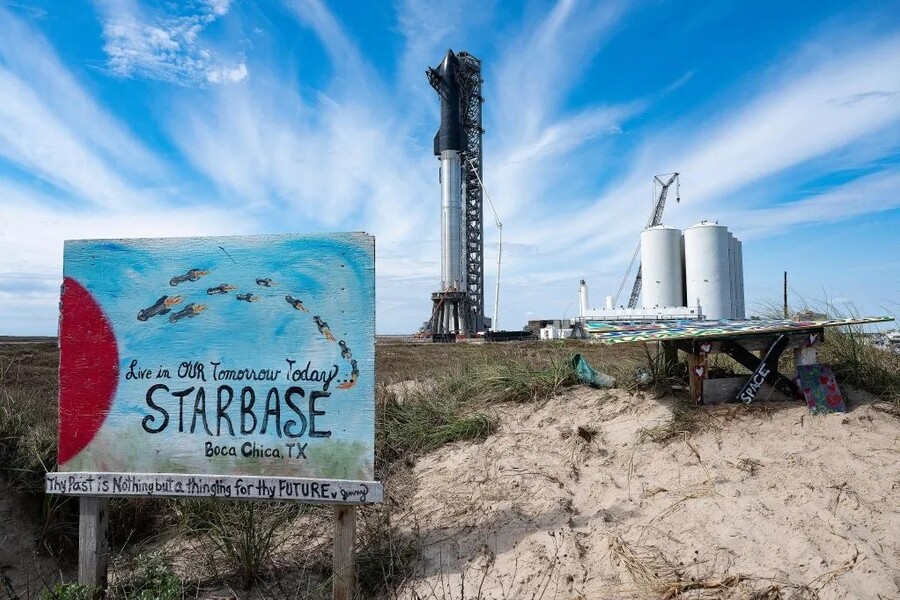Elon Musk has turned a long-standing ambition into reality as his private space company, SpaceX, successfully transformed its South Texas rocket launch site into an official municipality now known as Starbase. Following a decisive vote among the small local population, mostly comprised of SpaceX employees, the community overwhelmingly approved the incorporation, marking a significant development not just for the company, but for the evolving relationship between private enterprise and civic governance.
The results of the vote, published by the Cameron County Elections Department, showed 212 residents voting in favor of incorporation, with only 6 opposed. With just 283 eligible voters in the area, the outcome was widely expected due to the influence of SpaceX in the region. The newly formed city spans approximately 1.5 square miles and sits near Boca Chica Beach at the southernmost tip of Texas, near the Mexico border. While the area might appear modest in size and population, it plays a central role in some of the world’s most ambitious space missions.
The Starbase facility is where SpaceX designs, builds, and launches its Starship rockets—the heavy-lift launch vehicles that Musk envisions will one day take humans back to the Moon and ultimately to Mars. The facility has hosted multiple high-profile test launches and continues to be a centerpiece of NASA and Department of Defense partnerships.
Musk initially floated the idea of incorporating Starbase back in 2021. At the time, many viewed it as a symbolic gesture or PR move. But with the vote now complete, the city of Starbase is legally recognized, and the groundwork is being laid to establish a functioning city government, complete with a mayor and city council. Shortly after the vote, Musk celebrated on his social platform X (formerly Twitter), posting simply: “It is now a real city!”
While Musk and his supporters have lauded the decision as a bold step toward innovation and autonomy, the incorporation has sparked widespread debate. Critics argue that turning the SpaceX site into a fully fledged city could grant the company disproportionate control over the area, especially public resources like Boca Chica Beach and the nearby state park. These areas, which have historically been open to the public, are frequently closed for rocket launches and tests. Currently, authority over beach closures rests with Cameron County officials, but new bills in the Texas Legislature could soon shift that power to Starbase’s new municipal government.
Opponents worry this change could effectively privatize public lands, giving Musk’s company the legal right to limit or deny beach access at will. Some of the proposed legislation includes strict penalties for defying city-issued evacuation orders during launch operations, including fines and possible jail time. One such bill would make it a Class B misdemeanor—with a penalty of up to 180 days in jail—for anyone who refuses to leave the beach when ordered.
Local officials, environmental advocates, and Indigenous groups have voiced concern over these developments. The South Texas Environmental Justice Network organized protests during the city vote, drawing dozens of residents who feared the loss of access to culturally and ecologically significant sites. Among them was Josette Hinojosa, a mother who has brought her daughter to the beach for years. “Some days it’s closed, and some days you get turned away,” she said. “We never know when we’ll have access anymore.”
Others, like Christopher Basaldú, a member of the Carrizo/Comecrudo Nation of Texas, view the area as sacred. “This isn’t just important land—it’s sacred land,” Basaldú said during the demonstration. The group has long opposed industrial development on what they consider ancestral grounds.
Despite the backlash, SpaceX has maintained that managing Starbase as an official city is necessary to streamline operations and expand infrastructure. In a 2024 letter to Cameron County officials, Starbase General Manager Kathryn Lueders argued that the company already provides essential services such as road maintenance, utility management, schooling, and medical care for those living within the community. “We need the ability to grow Starbase as a community,” the letter stated, hinting at even broader plans for expansion and development.
Cameron County Judge Eddie Treviño Jr. expressed skepticism about shifting beach access authority from the county to the new city. “There’s no need for change,” he said. “The county and SpaceX have worked well together under the current arrangement.” He emphasized the importance of preserving public oversight over shared resources like Boca Chica Beach.
The incorporation of Starbase also raises broader legal and ethical questions. What does it mean for a private company to run a city where nearly all residents are employees or dependents? How will laws be enforced, especially when they might benefit corporate interests? And could this set a precedent for future corporate-led municipalities in other parts of the country or even beyond Earth?
As Starbase begins to form its local government, the answers to those questions remain uncertain. What is clear, however, is that the city will serve as both a hub for space exploration and a test case for a new kind of civic structure—one shaped not by grassroots democracy, but by the vision of one of the world’s most influential billionaires.
Looking ahead, SpaceX is seeking federal approval to increase launch frequency at the site from five to twenty-five per year. As activity at Starbase ramps up, so will scrutiny from government regulators, environmentalists, and advocates for public access. Whether the city of Starbase can balance rapid technological advancement with transparency, accountability, and community inclusion remains to be seen.
In the meantime, Elon Musk’s Starbase stands as a symbol of ambition realized—a city founded not by settlers or government mandate, but by rocket fuel, ambition, and corporate will.

